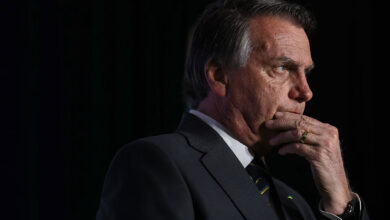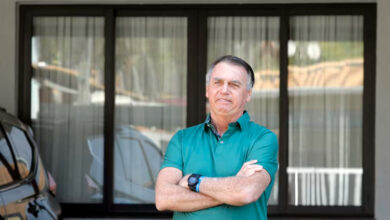
JUIZ DE FORA, Brazil (Reuters) – The leading candidate in Brazil’s presidential election is in serious but stable condition after being stabbed by an assailant at a campaign rally on Thursday, doctors said, pushing an already chaotic campaign into further disarray.
Far-right firebrand Congressman Jair Bolsonaro, a controversial figure who has enraged many Brazilians for years with divisive comments, but has a devout following among conservative voters, could take two months to fully recover and will spend at least a week in the hospital, said Dr. Luiz Henrique Borsato, who operated on the candidate.
“His internal wounds were grave and put the patient’s life at risk,” Borsato said, adding that a serious challenge now would be preventing an infection that could be caused by the perforation of Bolsonaro’s intestines.
The attack on Bolsonaro, 63, is a dramatic twist in what was already Brazil’s most unpredictable election since the country’s return to democracy three decades ago. Corruption investigations have jailed scores of powerful businessmen and politicians in recent years, and alienated infuriated voters.
There were fears that violence could flare across Brazil on Friday, as the nation celebrates its Independence Day and political groups are expected to march in hundreds of cities. Bolsonaro’s rival candidates called off their campaign activities for Friday.
Election impact
Under Brazilian campaign laws, Bolsonaro’s tiny coalition has almost no campaign time on government-regulated candidate ad blocs on TV and radio. That means he relies deeply on social media and raucous rallies around the country to drum up support. If Bolsonaro is not able to go out in the streets, it could jeopardize his campaign.
But Flavio Bolsonaro, the candidate’s son, said early Friday outside the hospital where his father was treated that he was conscious and the attack was a political boost.
“I just want to send a message to the thugs who tried to ruin the life of a family man, a guy who is the hope for millions of Brazilians: You just elected him president. He will win in the first round,” said Flavio Bolsonaro.
Bolsonaro, a retired Army captain, is running as the law-and-order candidate and positioned himself as the anti-politician despite having spent nearly three decades in Congress where he has managed to author just a few laws.
He has long espoused taking a radical stance on public security in Brazil, which according to United Nations statistics has more homicides than any other country.
Bolsonaro, whose trademark pose at rallies is a “guns up” gesture with both hands to make them resemble pistols, says he would encourage police to kill suspected drug gang members and other armed criminals with abandon.
He has openly praised Brazil’s military dictatorship and in the past said it should have killed more people.
In casting his vote on the floor of Congress for the 2016 impeachment of former President Dilma Rousseff, he dedicated his ballot to the military regime figure who oversaw the prison where Rousseff was jailed for three years and brutally tortured.
Bolsonaro faces trial before the Supreme Court for speech that prosecutors said incited hate and rape. He has called the charges politically motivated.
Political violence is rampant in Brazil at the local level.
For instance, in the months before 2016 city council elections in Baixada Fluminense, a hardscrabble region the size of Denmark that surrounds Rio de Janeiro, at least 13 politicians or candidates were murdered before ballots were cast.
Earlier this year, Marielle Franco, a Rio city councilwoman who was an outspoken critic of police violence against slum residents, was assassinated.
But violence against national political figures, even in the extremely heated political climate that has engulfed Brazil in recent years, is rare.
Suspect caught
The Federal Police said in a statement that it had officers escorting Bolsonaro at the time of the knife attack and the “aggressor” was caught in the act. It said the circumstances were being investigated.
Local police in Juiz de Fora confirmed to Reuters that the suspect, Adelio Bispo de Oliveira, 40, was in custody and that he appeared to be mentally disturbed.
Oliveira was affiliated with the leftwing Socialism and Liberty Party from 2007 to 2014, the party said in a written statement, in which it repudiated the violence.




